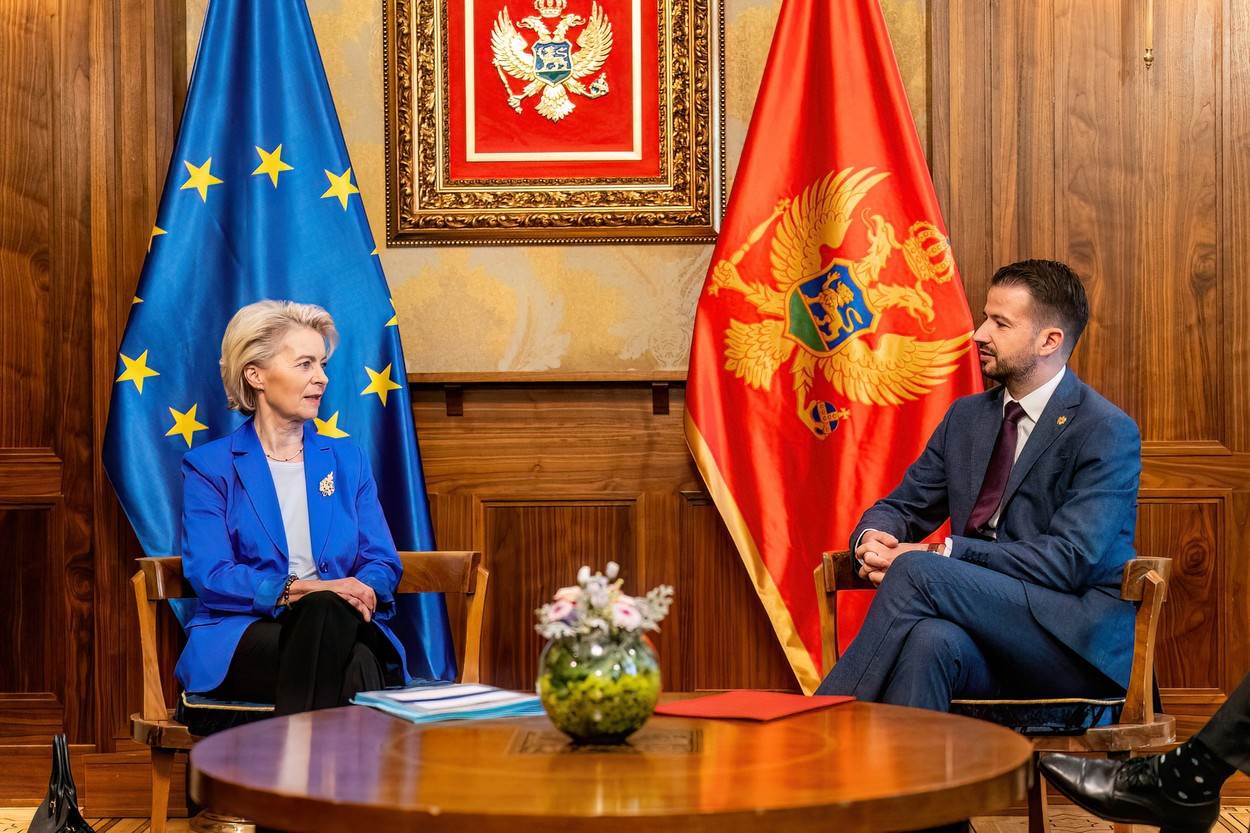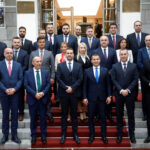President of the European Commission, Ursula von der Leyen, is on a four-day visit to North Macedonia, Kosovo, Montenegro, Serbia, and Bosnia and Herzegovina.
Together with Prime Minister Dimitar Kovačevski of North Macedonia, she held a joint press conference after a bilateral meeting held with the country’s government. Speaking at the event, von der Leyen noted she had come to tell citizens of North Macedonia that they are “on your way” to joining the EU and that she looks forward to welcoming them there. She also recalled the EU’s long history and that it hasn’t always been 27 states. Therefore, one day the EU will accept North Macedonia with its unique identity and its own language. She added that one day, the bloc will officially add Macedonian language to the list of 24 languages now spoken in the EU. North Macedonia already embodies the EU motto – united in diversity – and that is why Skopje was honored with a prestigious title of European City of Culture 2028, the head of the EC recalled. She expressed hope that all parties will support constitutional changes, as everyone is responsible for their country’s future. Another message was the need to consolidate the country’s economy. Brussels has an investment plan for the region worth EUR 30 billion, which can be quickly implemented.
Kovačevski said that during the meeting, the parties discussed a clear plan for economy growth, which would bring concrete advantages to the country and citizens before full membership is acquired. With its implementation, which also depends on the EU, the Western Balkans will double the size of the region’s economy, with growth expected at around 10 percent of GDP. Some of the benefits of the plan include the possibility of opening access to the EU market for Macedonian goods, increasing the volume of duty-free shipments, positive movement of services in the field of e-commerce, and improving the quality of education. It was stated that since the country sealed independence and until today, EU support for North Macedonia has amounted to more than EUR 3.3 billion.
In Tirana, the head of the European Commission, after meeting with President Vjosa Osmani, said Kosovo should accept the project to create a Community of Serb Municipalities, while Serbia should “de facto” recognize Kosovo. At a joint press conference with Osmani, von der Leyen said she expressed her condolences for the Kosovo policeman slain in Banjska on September 24, stressing that such attacks are absolutely unacceptable and that those responsible must be brought to justice. The head of the EC noted that Kosovo had made steady progress, especially in strengthening democracy through reform, but there is still a lot of work ahead. The main thing is that success can only happen if Kosovo and Serbia normalize their relations, Von der Leyen emphasized, noting that Kosovo’s economy is 27 percent of the average value of an EU economy and that much more needs to be done. In turn, President Osmani said it was important to raise the status of Kosovo to a candidate country at the December summit of the EU Council. She emphasized the need for the EU to cancel punitive measures against Pristina, as Kosovo institutions have taken real steps towards holding new elections in the north of Kosovo. Osmani noted that Kosovo was determined to respect its Constitution, which provides more extensive rights to minorities than many other European countries do.
During the visit of the EC president to Montenegro, at a joint press conference with President Jakob Milatović, the latter mentioned the significant comparative advantages that make Montenegro closer to the EU than other candidate countries, and that the prospect of full membership by 2030 is realistic. He stressed that Montenegro’s accession to the European Union will be an excellent message to all other candidate countries that the enlargement process continues. He highlighted the importance of the plan for the Western Balkans’ growth, which will further focus the issue of enlargement from a predominantly political to an economic aspect. Milatović added that deepening regional economic cooperation with the EU support would contribute to the optimal utilization of pre-accession support and be an additional incentive for accelerating significant reforms at the domestic level. The president of Montenegro believes that in the near future, the new parliament convocation will ratify the commitments assumed within the Berlin Process and ensure the country’s full contribution to its implementation.
The ongoing visit of the European Commission president to the Western Balkans is truly a landmark. Brussels decided to send the four states across the region an additional signal about the EU’s readiness for the enlargement process, so the candidates for EU membership should quickly fulfill their previously undertaken obligations, which will actually pace up the process. The 2030 deadline for the accession is rather realistic for all countries in the region. And only the lack of desire to fulfill the obligations assumed can thrown candidates out of the new wave of EU expansion. Previously, the nations in the Western Balkans would often accuse Brussels of delaying their accession but now everything depends solely on them. All the citizens of the Western Balkan countries are already aware of this, and from now on they can influence their governments so that they fulfill Brussels’ demands without dragging. After all, this may cost them a real opportunity to join the influential Union of 27 European states.



